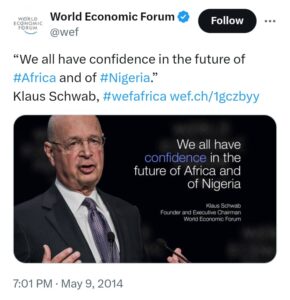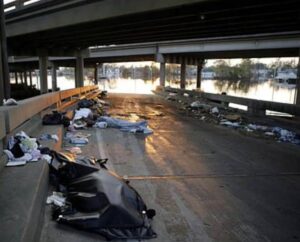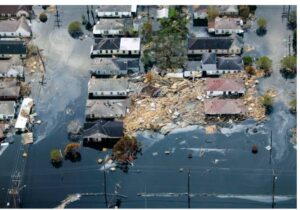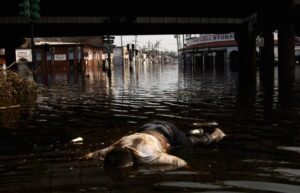
In the most resource rich country in the WORLD, there is NO reason why ANY Nigerian should go hungry. Or die of TREATABLE diseases. Some folks don’t have water to bathe tonight because of bad politics and governance. Or can’t send their babies to school!
By Wenona Russ
In January 2024, Vice President Kashim Shettima along with a group of 5 other delegates traveled to Davos, Switzerland to the 2024 WEF Forum held every year. At this event, global leaders from around the world attend and sit at the global roundtable to discuss, deliberate, to share innovative agendas and ideas to help improve the economics of countries around the world.
It is an impressive event and anyone in attendance is considered ‘the elite.’ At this WEF event, the global leaders discuss their respective national governments. It is a chance for them to ‘sell their country’ and present ideas and investment opportunities to leaders worldwide.
VP Shettima presented a strong sales pitch – if you will – for Nigeria. He mentioned how he was not at WEF to beg for the world to invest in Nigeria. He spoke on how to integrate Business opportunities in Nigeria and he offered suggestions on how to improve private sector businesses. Himself being a banker in the past, he was well versed in the area of talking numbers and finance to the elite of the finance industry. Keep in mind, the WEF is comprised mostly of bankers worldwide. Bankers know ‘banker-speak.’
There was also a Nigeria Night event, where the arts and culture as well as the cuisine of Nigeria was perfectly presented.
One thing Nigeria knows how to do is to present a SHOW, cook GREAT meals and have a GOOD time while doing so!
BRAVO to VP Shettima and the Delegates of the WEF 2024 event!
But when all the Jollof Rice is finished, when all the drinks are done, once everyone is sweaty from dancing to Davido and Tiwa Savage…
And once everyone boards their first class flights back home and land in Abuja…
The problems that plague Nigeria STILL exist!
Everyone goes back to their respective countries. And the potential investors that congregated in the back rooms of the WEF are ready to sign those checks and invest in a better Nigeria!
I have to wonder if the Lagos-Calabar highway was one of those hot topics of discussion at the WEF event this year held at the end of January..
It HAD to have been! What else would explain the FG rushing the PREMATURE demolition of many homes and businesses, including the prestigious Landmark Resorts in Lagos.. in MARCH???
With the construction of any highway, you don’t just wake up one morning and declare ‘HEY GUYS, WE ARE GOING TO BUILD A HIGHWAY ALONG THE COAST!’
There is much planning and assessments, studies even, that must be conducted before a government takes on the task of building a highway….ESPECIALLY one that is along a coast or over a body of water.
Surveying underground demographics and conducting environmental impact assessments before building highways typically fall under the purview of civil engineers, environmental scientists, and other relevant experts in infrastructure development. These professionals work to ensure that construction projects comply with regulations, minimize environmental impact, and address potential risks. These tests can take YEARS to properly conduct. NOT TWO MONTHS!!!
Before constructing coastal highways, several critical tests and assessments are required to ensure environmental sustainability, structural integrity, and socio-economic viability. These include:
- Environmental Impact Assessment (EIA):
- An EIA evaluates the potential environmental effects of the proposed highway project, including impacts on local ecosystems, wildlife habitats, water quality, and coastal erosion. This assessment involves detailed studies and consultations with stakeholders to identify mitigation measures(REPORT AFRIQUE International) (Law and Society Magazine.).
- Geotechnical Investigation:
- This investigation assesses the soil and subsoil conditions along the proposed route. It includes soil sampling, borehole drilling, and testing to determine soil strength, composition, and stability. These tests help in designing appropriate foundations and earthworks for the highway (Businessday NG).
- Hydrological Studies:
- These studies analyze the potential effects of the highway on local water bodies, including rivers, streams, and coastal areas. They assess the risk of flooding, changes in water flow, and the potential for erosion or sedimentation. Hydrological modeling is often used to predict these impacts and design appropriate drainage systems.
- Coastal Engineering Studies:
- Specific to coastal highways, these studies examine coastal dynamics, including wave patterns, tides, and storm surges. They help in designing structures that can withstand coastal forces and minimize impacts on the shoreline. This includes evaluating the need for protective measures like sea walls, groynes, and breakwaters (Law and Society Magazine.).
- Socio-economic Impact Assessment:
- This assessment evaluates the potential effects of the highway on local communities, including displacement, changes in land use, and economic impacts. It involves stakeholder engagement to understand community concerns and develop strategies to minimize negative impacts and enhance positive outcomes.
- Cultural and Heritage Assessments:
- These assessments identify and evaluate the impact on cultural and heritage sites along the proposed route. They help in preserving important historical and cultural landmarks and ensuring compliance with heritage protection laws.
- Climate Change Resilience Assessment:
- This assessment examines the potential impacts of climate change on the highway, including sea-level rise, increased frequency of extreme weather events, and temperature variations. It ensures the highway is designed to be resilient to future climatic conditions.
- Traffic and Transportation Studies:
- These studies analyze current and projected traffic volumes to ensure the highway can accommodate future transportation needs. They help in planning for appropriate capacity, safety measures, and connectivity with existing transportation networks.
Conducting these tests and assessments is crucial for the sustainable development of coastal highways, ensuring they are safe, environmentally sound, and beneficial to local communities and economies (REPORT AFRIQUE International) (Law and Society Magazine.).
Being a native of New Orleans Louisiana in the USA – a coastal city as well as being a city that is BELOW SEA LEVEL – I can attest to the absolute necessity that proper surveying and studies of the coast and underground demographics in order to ensure that the highway is safe, sustainable and offer a viable means of transport to the general public – especially during a national emergency.
I was a victim of Hurricane Katrina back in 2005. Many New Orleanians lost their lives and property due to poor planning by the U.S. Corps of Engineers. Parts of major highways were flooded and/or destroyed. Levees were breached which caused catastrophic flooding and major loss of property and lives….thousands!
When I see flooding occur here in Nigeria, I think of Katrina flooding and the hardships suffered by mostly Black people (N.O. is predominantly 72% African American). I think of how the government let us down and how we lost so much due to outright governmental neglect, exploitation, racial profiling of an entire city and constructing highways and levees without conducting the proper studies or following proper procedures to ensure New Orleanians and anyone traveling through N.O. were safe!.
It took 20 years to build Interstate 10 (I-10) through the City of New Orleans. Several ‘upgrades’ to I-10 took place over the years. But due to environmental factors, erosion and overcrowding of suburbs, these factors were not taken into consideration when building the highway.
The levee system built to protect N.O. from flooding initially was created in 1930 and went through many phases of development by the U.S. Army Corp of Engineers. However, due to neglect, mismanagement of governmental funds, lack of planning, Katrina happened.
And the City of New Orleans was NOT READY!
So if it took decades to build I-10 which spans 2,460 miles across the United States from Santa Monica, California on the West Coast to Jacksonville, Florida on the East Coast, why did the Nigerian government RUSH this project….SO soon after meeting with the elite in Davos this year???
If Nigeria is serious about improving the economy NOT just for the elite but for ALL NIGERIANS, it takes accountability and proper planning. It’s not just in the sales pitch that is offered to potential investors. You MUST make sure that the ‘product’ you are selling is a reputable and profitable product that will yield MUCH returns.
I was highly disappointed when Nigeria was rejected to be a part of BRICS last year. I was optimistic and extremely hopeful that the green and white would be inducted.
Reasons Nigeria is not a part of BRICS include the size and instability of her economy. Despite being Africa’s most populous country and a significant economic player, Nigeria’s GDP has been affected by currency evaluation and economic instability. For instance, Nigeria’s economy, valued at around $400 billion, is smaller compared to Saudi Arabia ($1.06 trillion) and Argentina ($641 billion) who recently have been approved to join BRICS.
The Nigerian government has yet to learn that sentiment and worship of every other government and culture except her own will greatly hinder the country from being a forerunner economically on the African continent. Ties to the West and allegiances to the UK and Britain…even the preference to do business with countries that still oppress and devalue your people can only serve to hinder economic growth for ALL. (Why is there NOT an African Diasporan Chamber of Commerce in Abuja?)
According to the WEF Travel and Tourism Report 2024, Nigeria’s Travel and tourism industry grew: “Travel & Tourism-enabling conditions in developing economies continue to improve, but far more is needed to close the sector-enabling gap……Nigeria (+4.2%, 113th to 112th)……. Nonetheless, despite above-average growth, non-high-income economies account for nearly 90% of below-average index scorers, indicating a need for further investment to close gaps in enabling conditions if these economies wish to increase their share of the Travel & Tourism market and improve their readiness for future risks and opportunities.” {Courtesy of Travel & Tourism Development Index 2024 | World Economic Forum (weforum.org)}
In spite of this minimal growth in travel and tourism, there are still many other factors that are slowing further growth in an industry that can catapult Nigeria to the forefront of the African Union as a major player of economics on the continent.
As I stated last week, the government is hindering growth in an industry that can empower the regular Nigerian to provide for their families and communities. Offering opportunities in tourism and leaving those entities ALONE, allowing them to do business independent of governmental control and manipulation WILL give jobs to the public.
In the most resource rich country in the WORLD, there is NO reason why ANY Nigerian should go hungry. Or die of TREATABLE diseases. Some folks don’t have water to bathe tonight because of bad politics and governance. Or can’t send their babies to school!
Instead of bulldozing private businesses, closing down resorts and demolishing jobs, maybe the government should focus on SECURING Nigeria…and leave the BUSINESS to THE PEOPLE.
ALL HAIL NIGERIA!











